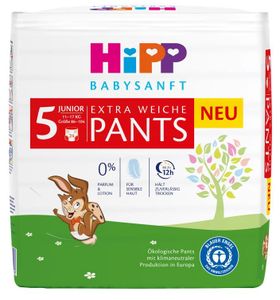Environmentally friendly Nappies, feminine hygiene and incontinence products (DE-UZ 208)
Around ten million nappies are used and then thrown away every day in Germany. In addition, there are approximately 46,100 tonnes of feminine hygiene products sold every year1. Around 5 million people are affected by incontinence in Germany. In outpatient care alone, statutory health and nursing care insurance providers use about 4.9 million incontinence products every day2. Not only are a large amount of raw materials used in their production but they also produce a lot of waste: According to projections based on these figures, 154,680 tonnes of waste nappies are produced annually.
In addition, the wearing of absorbent hygiene products means that these products are in regular contact with the skin or mucous membranes and thus even the smallest quantities of chemicals harmful to health could have a negative impact. Furthermore, the use of lotions and fragrances is prohibited in those products awarded with the environmental label to avoid the risk of allergies.
Another main focus is placed on the origins and production processes for the fluff pulp. The fluff pulp must be exclusively sourced from certified, sustainably operated businesses that remain close to nature (e.g. FSC, PEFC) and engage in energy efficient and low emission fluff pulp production. In the case of other biogenic raw materials that may be used in the products, only certified biomass is approved. One example is the requirement for 100% organic cotton.
In an application test, the products must also achieve a minimum level of satisfaction with respect to their fitness for use and quality from 80% of the test subjects.
-

Hipp Babysanft pants size Junior, XL
Hipp Austria GmbH -

Hipp Babysanft diapers size Micro, NB, Mini, Midi, Maxi, Junior, XL
Hipp Austria GmbH -
Benefits to the Environment
- tested for harmful substances and free from cosmetic additives
- 100% pulp from sustainable forestry
- high usability
